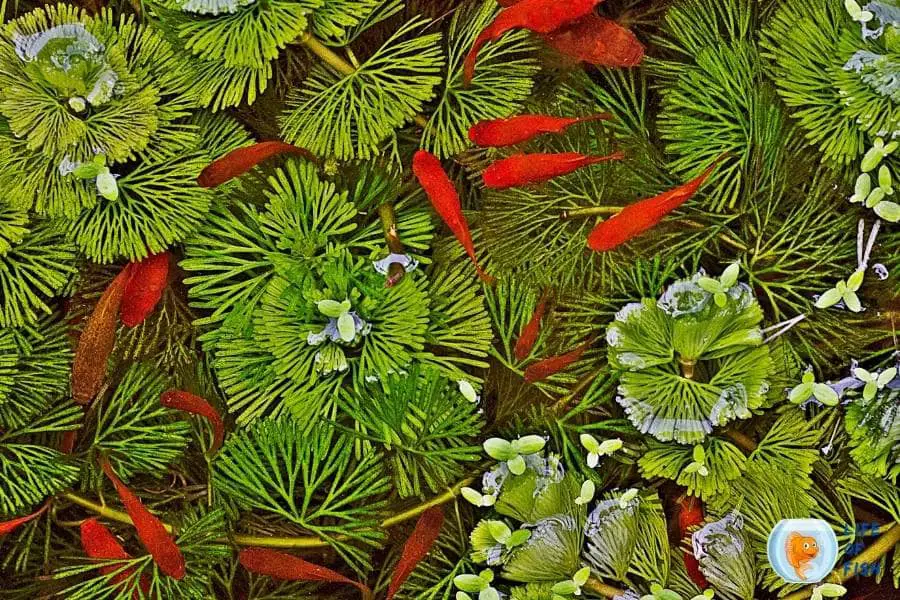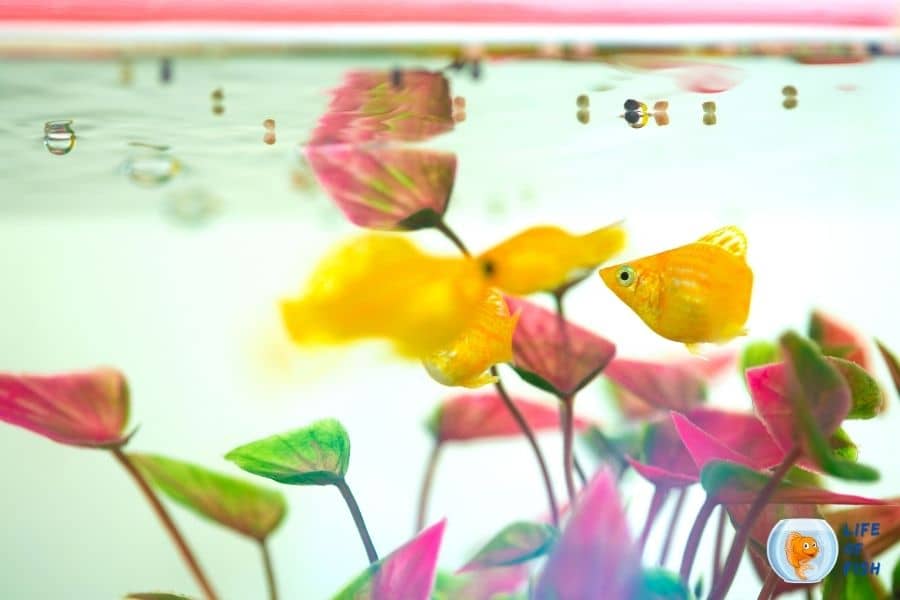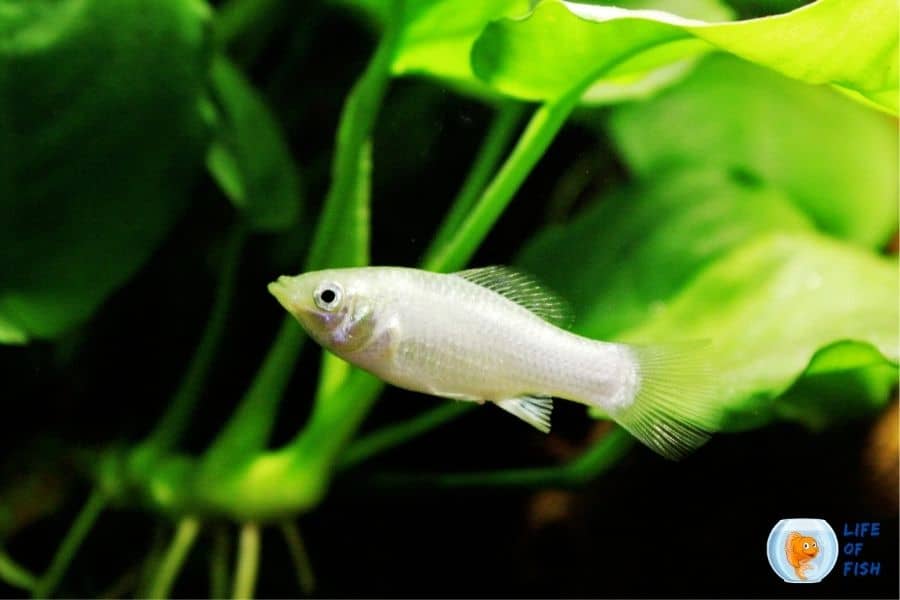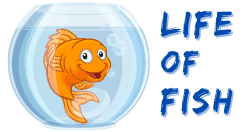Mollies are interesting fish species because they are active schooling fish. They prefer heavily planted aquariums as they like shelter to rest and hide and Mollies Eat Plants.
But, can we keep live plants with mollies? Do mollies eat plants? Let’s discuss it today.
Do mollies eat plants?
Jump To
- 1 Do mollies eat plants?
- 2 Do mollies eat moss?
- 3 Do balloon mollies eat algae
- 4 Do mollies eat duckweed
- 5 How do you stop fish from eating plants?
- 6 What do mollies eat?
- 7 How often should you feed them?
- 8 Do mollies eat live plants?
- 9 Do balloon mollies eat plants?
- 10 Do black mollies eat plants?
- 11 What plants do mollies eat
- 12 What live plants are good for Mollies?
- 13 What plants are toxic to fish?
- 14 Can too many plants kill fish?
- 15 Does Molly like fish wafers?
Yes. Mollies eat plants as they are omnivorous species. They constantly nip and try to eat anything they find in their surroundings. And they are ALWAYS hungry. Mollies are continuous feeders. So, they will eat anything edible every time. Also, mollies are well known for overeating.

Because of that, they need a well-filtered aquarium to filter excess detritus. Keeping them in a planted tank will make things worse because they get a constant food source for eating all the time with plants.
Do mollies eat moss?
Yes. Mollies eat moss because they are omnivore species. Mollies are known for eating just about anything, and moss is no exception. In the wild, mollies are exclusively plant-and-algae eaters.
So, it is their nature to eat any plant they find in an aquarium. However, as moss is a rapidly growing plant, you don’t have to worry about molly’s moss-eating issue.
Do balloon mollies eat algae
Yes. Balloon mollies eat algae. Mollies are famous algae-eating fish. Although they can not get rid of algae in an aquarium, they certainly eat algae from rocks and plants.
So, mollies can be a great addition if you have algae blooms in your aquarium with other algae-eating species. Find more about this in our article ” Do Mollies Eat Algae? ”
Do mollies eat duckweed
Yes. Mollies eat duckweed. Actually, mollies love them. They will eat duckweed like crazy. Duckweed is a safe, sustainable, and healthy fish food.
So, you don’t have to worry about mollies eating duckweed.

How do you stop fish from eating plants?
The only way to stop mollies from eating plants is to feed them more. However, overfeeding causes many complications inside the aquarium, such as,
- Increasing fish waste because of overfeeding
- Water pollution because of rotted leftover food
- Fish health problems arise, such as constipation and other digestive issues.
However, you can try keeping algae wafers in various spots inside your aquarium to stop fish from eating plants.
Unfortunately, this method will only decrease the number of plants they eat and not completely prevent them from eating.
You can also replace your plants with hard-leaved plants so that mollies can not nip because of their size. But, eventually, mollies will eat at least a part of your plants.
Alternatively, you can remove all the live plants and replace them with plastic or any other artificial plants that are safe for aquariums.
This way, you can keep your aquascape nearly good (I know you can not get the beauty of live plants from artificial plants. Sorry.) and can avoid overfeeding.
Whatever method you try, your mollies will still eat plants. That is their nature. So, if you prefer a planted aquarium, mollies may not be a suitable choice unless you can let them eat your plants.
What do mollies eat?
Feeding mollies is easy because they eat anything you throw at your aquarium. But, they have some nutritional requirements.
As they are omnivore species, they need both meat and vegan-based food. So, let’s find out what mollies eat in the wild and in aquariums.
In wild
In the wild, mollies eat small invertebrates like mosquitoes, insects, and blood worms. They also eat algae and plant matter. Mollies also eat decaying plants and dead fish.
They are very dissatisfying eaters that try to eat at every opportunity they get. So, in short, mollies eat anything they find edible. However, they mostly eat algae and plant matter in the wild.
In aquarium
As mollies are omnivorous species, they need both protein and vegetation in their diet. So, it is essential to feed them with a balanced diet to keep them healthy.
If you have live plants in your aquarium, they will definitely eat them although you feed them well. They also eat algae build up in aquariums.
Other than already available food, they eat pellets, flakes, algae wafers, frozen and live foods such as Frozen bloodworms, Freeze-dried bloodworms, Frozen brine shrimp, Freeze-dried brine shrimp, and vegetables such as Cucumbers, Zucchini, and Spirulina.
Mollies also eat peas, green beans, and many other vegetables. Actually, they will eat anything you feed them in an aquarium.
However, you shouldn’t feed them rice, bread, or any other carb food as carbohydrates are not healthy for your fish.

How often should you feed them?
Mollies are well-known continuous eaters. They are always hungry and will eat every time you feed them. However, you shouldn’t feed them often because,
- Overfeeding will increase your fish’s waste production, which will foul the water
- Any food left to rot in the aquarium will also pollute the water
- Overfeeding causes many health problems, ranging from constipation to other digestive issues.
The best feeding schedule to feed mollies is two times per day. As mollies are small fish, two times feeding is more than enough for them.
Ensure that you provide your fish with plenty of food to consume within 5 minutes and remove any excess food after five minutes.
Do mollies eat live plants?
Yes. Mollies eat live plants as well as decaying plants. This is because they get hungry all the time and search for food every time. As they are omnivore species, mollies eat live plants.
Do balloon mollies eat plants?
Every molly species eat plants, and there is no exception for balloon mollies. Plants and algae are mollies’ favorite food in the wild as they are readily available all the time.
So, if you have any live plants in your aquarium, their instincts will work as with any wild animal and will eat plants although you feed them well.
Related : How Long Are Mollies Pregnant For? 12 Things To Know
Related : Are Molly Fish Aggressive? | 18 Things Must Know
Do black mollies eat plants?
Yes. Just like balloon mollies, black mollies are also a species of Mollies. All molly species eat plants.
Plant and algae are their primary food source in the wild because they are readily available at any time. And mollies like to eat plant matter than meat matter. So, they will eat plants if you keep the plants in your aquarium.
Related : Is Molly Guppy Hybrid Possible? All You Need To Know
Related : Dalmatian Molly Care | Care Sheet| Complete Guide
What plants do mollies eat
Mollies eat any plant they find edible. Mollies like to explore everything around them and nip at everything. When they find an edible plant, mollies will start to eat that plant.
What live plants are good for Mollies?
Mollies prefer densely planted aquariums to rest, eat and hide. Vigorous aquarium plants that do not die easily are recommended to keep with mollies. Some suggested vigorous aquarium plants are Java fern, Sagittaria, Vallisneria, and Anubias.
We recommend maintaining mosses like java moss and Christmas moss in your aquarium if you have both male and female mollies.
Mollies are livebearers, and they reproduce often. So, your aquarium needs to have suitable places for molly fry to hide. Mosses are the best aquarium plants for that job.
What plants are toxic to fish?
Some plants have toxic chemicals for fish. However, most of these plants are garden plants. Aquarium plants, most of the time, don’t contain any harmful chemicals to fish.
The fruits, leaves, barks, or any other part of these plants may fall to your aquarium or pond and mollies may eat them.
As I said before, mollies will eat whatever they find in an aquarium. So, keeping these toxic plants near your aquarium poses a severe risk to your mollies.
Plants that all parts are toxic to fish
- Angel’s trumpet (Datura spp.)
- Azalea (Rhododendron spp.)
- Black walnut (Juglans nigra)
- Caladium (Caladium spp.)
- Chokecherry/Cherry (Prunus spp.)
- Climbing nightshade (Solanum dulcamara)
- Foxglove (Digitalis spp.)
- Jack-in-the-pulpit (Arisaema spp.)
- Juniper (Juniperus virginiana)
- Larkspur (Consolida ajacis)
- Lily-of-the-valley (Convallaria majalis)
- Monkshood (Aconitum spp.)
- Morning glory (Ipomoea spp.)
- Peony (Paeonia spp.)
- Pinks (Dianthus spp.)
- Snapdragon (Antirrhinum spp.)
- White snakeroot (Eupatorium rugosum)
- Wisteria (Wisteria spp.)
- Yew (Taxus spp.)
Plants that leaves are toxic to fish
- Bleeding heart (Dicentra spp.)
- Castor bean (Ricinus communis)
- Flowering tobacco (Nicotiana alata)
- Red maple (Acer rubrum)
- Tomato (Lycopersicon esculentum)
Plants that fruits/berries/nuts/seeds are toxic to fish
- Castor bean (Ricinus communis)
- Daphne (Daphne spp.)
- Holly (Ilex spp.)
- Horsechestnut (Aesculus spp.)
- Jasmine (Jasminum spp.)
- Mockorange (Philadelphus hybrids)
- Sweet pea, everlasting pea (Lathyrus spp.)
Can too many plants kill fish?
Though aquatic plants can provide necessary shelter, food, and oxygen to the fish, they also consume oxygen and produce CO2 at night.
This respiration process shouldn’t be a problem at all if you have a balanced plantation in your aquarium. But, if you have high plant loads in your fish tank, your fish will suffer at night due to low oxygen and high CO2 levels.
Oxygen is vital to any aquarium species, and if they don’t receive enough oxygen, they will die. Experts recommend approximately 15-25 percent of aquatic plants in an aquarium to avoid oxygen depletion. So, yes. Too many plants can kill fish.
Does Molly like fish wafers?
For mollies, everything is food. They will eat anything they get all the time as they are always hungry. This is because mollies have no stomachs, causing them to produce so much waste.
Fish wafers are made with algae. Algae are one of their favorite foods, so mollies love to eat fish wafers.
Find more Definitive Fish Guides
